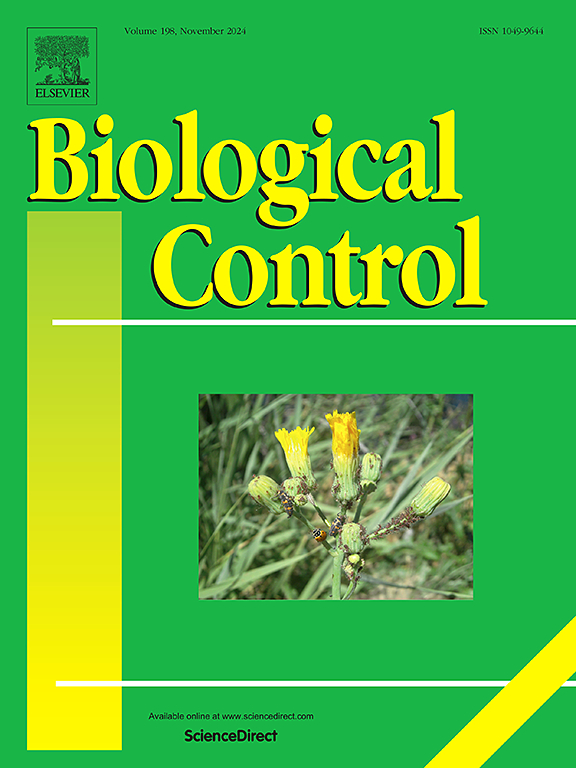Antifungal activity of Bacillus velezensis HY13 against anthracnose disease of Buxus bodinieri caused by Colletotrichum fructicola
IF 3.4
2区 农林科学
Q2 BIOTECHNOLOGY & APPLIED MICROBIOLOGY
引用次数: 0
Abstract
Anthracnose, caused by Colletotrichum fructicola, is a serious disease of Buxus bodinieri. Microbial antagonists provide a novel approach for sustainable plant disease management. This study investigated the biocontrol efficacy of Bacillus velezensis HY13 against anthracnose in B. bodinieri and elucidated its underlying mechanisms. The results showed that B. velezensis HY13 significantly inhibited C. fructicola growth suppressed lesion expansion on B. bodinieri leaves in vitro. HY13 exhibited the ability to secrete extracellular hydrolytic enzymes, including chitinase (CHI) and β-1,3-glucanase (GLU), synthesize lipopeptides exhibiting antimicrobial, as well as form robust biofilms. Furthermore, HY13 treatment disrupted the cell membrane integrity of C. fructicola, leading to increased leakage of cellular contents from the fungal mycelium. In addition, anatomical examination of B. bodinieri leaves indicated that HY13 application enhanced leaf blade thickness (TLB), palisade parenchyma thicknesses (TPP), spongy parenchyma thicknesses (TSP) and lower epidermis thickness (TLE), thereby strengthening the physical barrier against pathogen invasion. Therefore, it is concluded that B. velezensis HY13 is a potent biocontrol agent for managing anthracnose in B. bodinieri.
velezensis HY13对核桃炭疽杆菌炭疽病的抑菌活性研究
炭疽病是由炭疽菌(Colletotrichum fructicola)引起的一种严重病害。微生物拮抗剂为植物病害的可持续管理提供了新的途径。本研究研究了velezensis HY13对bodinieri炭疽病的生物防治效果,并阐明了其作用机制。结果表明,叶面芽孢杆菌HY13在离体条件下能显著抑制果霉生长,抑制叶片病变扩张。HY13能够分泌胞外水解酶,包括几丁质酶(CHI)和β-1,3-葡聚糖酶(GLU),合成具有抗菌作用的脂肽,并形成坚固的生物膜。此外,HY13处理破坏了果霉的细胞膜完整性,导致真菌菌丝体的细胞内容物渗漏增加。此外,对白桦叶片的解剖检测表明,施用HY13可提高白桦叶片厚度(TLB)、栅栏薄壁厚度(TPP)、海绵薄壁厚度(TSP)和下表皮厚度(TLE),从而增强对病原菌入侵的物理屏障。综上所述,白僵菌HY13是一种防治白僵菌炭疽病的有效生物防治剂。
本文章由计算机程序翻译,如有差异,请以英文原文为准。
求助全文
约1分钟内获得全文
求助全文
来源期刊

Biological Control
生物-昆虫学
CiteScore
7.40
自引率
7.10%
发文量
220
审稿时长
63 days
期刊介绍:
Biological control is an environmentally sound and effective means of reducing or mitigating pests and pest effects through the use of natural enemies. The aim of Biological Control is to promote this science and technology through publication of original research articles and reviews of research and theory. The journal devotes a section to reports on biotechnologies dealing with the elucidation and use of genes or gene products for the enhancement of biological control agents.
The journal encompasses biological control of viral, microbial, nematode, insect, mite, weed, and vertebrate pests in agriculture, aquatic, forest, natural resource, stored product, and urban environments. Biological control of arthropod pests of human and domestic animals is also included. Ecological, molecular, and biotechnological approaches to the understanding of biological control are welcome.
 求助内容:
求助内容: 应助结果提醒方式:
应助结果提醒方式:


